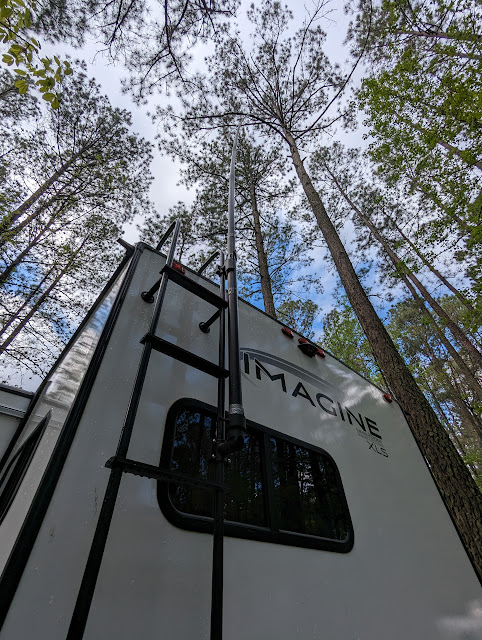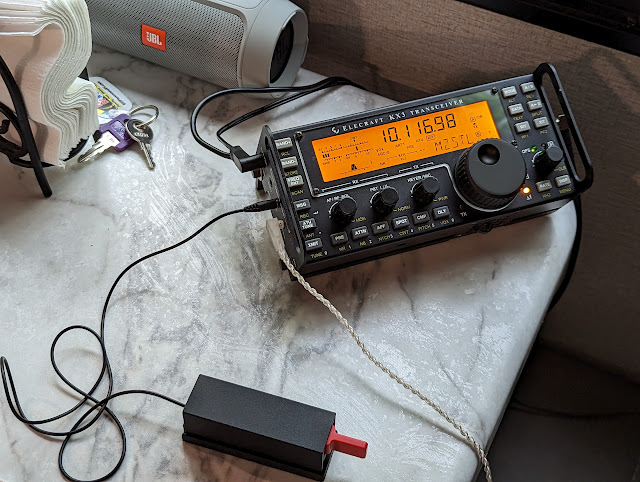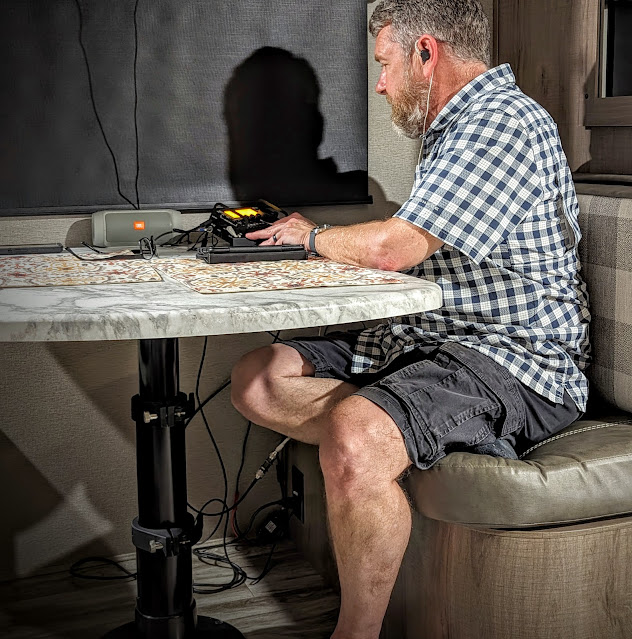 Portable Ops in Comfort
Portable Ops in Comfort
 |
| Working my rolling shack portable station from air-con comfort |
 |
| Early try with a military fiberglass pole mast |
 |
| Now I use a Flagpole Buddy with a 30 foot telescoping mast |
 |
| Gone RF fishing with a 30 foot pole and a big sinker. |
 |
| Palm Radio Single Paddle |
 |
| On the Eagle the Palm Radio Single magnetically attaches to the side |
 |
| Note the power and antenna connections under the table |
Richard Carpenter, AA4OO, is a regular contributor to AmateurRadio.com and writes from North Carolina, USA. Contact him at [email protected].
 AmateurLogic 180: Cheap Old Geaux Baux
AmateurLogic 180: Cheap Old Geaux Baux
AmateurLogic.TV Episode 180 is now available for download.
Emile builds a Geaux Baux. Software for NanoVNA analyzers. Dual Band Satellite Yagi, The Sequel.
George Thomas, W5JDX, is co-host of AmateurLogic.TV, an original amateur radio video program hosted by George Thomas (W5JDX), Tommy Martin (N5ZNO), Peter Berrett (VK3PB), and Emile Diodene (KE5QKR). Contact him at [email protected].
 Amateur Radio Weekly – Issue 281
Amateur Radio Weekly – Issue 281
The RFNM: A next generation SDR
10 MHz to 7200 MHz tuning range, 12-Bit ADCs and up to 612 MHz bandwidth.
RTL-SDR.com
DIY portable ops truck desk
The desk is comfortable to use and the truck can be driven when the desk is installed.
KK4Z
GridTracker receives 2023 Amateur Radio Software Award
The award recognizes software projects that enhance Amateur Radio.
ARSA
NTIA identifying spectrum to be repurposed
Agency is seeking public input on identifying new spectrum bands for potential repurposing.
CQ Newsroom
Ofcom hints at license changes
“We will consult on proposals to simplify our licensing framework for amateur radio licensing.”
Essex Ham
Tuning a Mag Loop via smartphone
You normally have an adjustment capacitor to tune the antenna to different frequencies.
Hackaday
Voice of America Museum of Broadcasting open additional hours for Hamvention
New exhibits include a dedicated room for Amateur Radio.
VOA Museum
Get in shape for Hamvention
Start walking a little each day and be in better shape for walking Hamvention.
KB6NU
Video
How to wind a toroid inductor
The real trick is often how to hold the toroid core.
W2AEW
How I’m logging my Parks on the Air (POTA) contacts
Getting back to basics by looking at key parts of a Parks on the Air activation.
KB9VBR Antennas
Build a DIY Dipole Antenna
A 10m dipole without a balun or commercial center insulator.
RADIO STATION AD0IM
5G to 6G cellular technology
The evolution of cellular technology in relation to First Net & ARES.
WB7OML
Get Amateur Radio Weekly in your inbox.
Sign-up here
Amateur Radio Weekly is curated by Cale Mooth K4HCK. Sign up free to receive ham radio's most relevant news, projects, technology and events by e-mail each week at http://www.hamweekly.com.
 ICQ Podcast Episode 400- Show 400 Celebration
ICQ Podcast Episode 400- Show 400 Celebration
In this episode, we join Martin Butler M1MRB, Chris Howard (M0TCH), Martin Rothwell (M0SGL), Frank Howell (K4FMH), Bill Barnes (WC3B) and Leslie Butterfields (G0CIB) to discuss the latest Amateur / Ham Radio news. Colin Butler (M6BOY) rounds up the news in brief and in the episode's feature is Our Recollections of 400 Shows.
We would like to thank ICQPodcast 400 Club Member Winston Lawrence, KD2WLL, Neil Connor (M6CUE), Malcolm Heath (KS0T), Ed Efchak (WX2R), one-off donors Michael Rosenberg (N9YB), Gary Bridges (WA0VMV) and our monthly and annual subscription donors for keeping the podcast advert free. To donate, please visit - http://www.icqpodcast.com/donate
- New Australian Ham Licences Delayed
- ISS Time Traveller
- Broadcaster Shuts Longwave Radio Transmitter in Iceland
- American Clubs Grow with Collaboration
- Ofcom Plan of Work
Colin Butler, M6BOY, is the host of the ICQ Podcast, a weekly radio show about Amateur Radio. Contact him at [email protected].
 Amateur Radio Weekly – Issue 280
Amateur Radio Weekly – Issue 280
Ria Jairam steps down from ARRL board, joins ARDC board [PDF]
“Ria is a powerful voice in amateur radio…”
ARDC
HamTestOnline to shut down
Owner, John, W1AI, will shut down the site on June 30th unless a buyer can be found.
W2LJ
New digital mode: FreeData
A new digital mode that uses the OFDM modem code from FreeDV for having keyboard to keyboard chats.
marxys musing on technology
Code execution exploit via APRS
An exploit targeting WinAPRS and WIndows XP allows code execution on remote PC.
Coalfire
How times have changed for portable ops
In the 60s, you wouldn’t operate for long off a battery with the amperage needed to warm all those tubes.
QRPer
Benefits of the Yaesu XF-130CN 300 Hz Crystal Roofing Filter
From the video you can hear that there is a very small demonstrable difference in strong signal rejection.
Ham Radio QRP
Delta loopy ideas
A delta loop has multiple possible feedpoints and the choice has to be made very carefully.
Ham Radio Outside the Box
World Amateur Radio Day is April 18
The day is being celebrated with a 2-week operating event occurring April 11 – 25.
ARRL
Military reliance on HF on the rise?
HF, unlike landline connections and submarine cables, cannot be blocked.
The SWLing Post
LIFEPO4 batteries for portable operations
For the same capacity they are more than half the weight of SLA batteries.
VE3IPS
Video
1944 soldering iron training film
1944 US Office of Education black-and-white training film.
PeriscopeFilm
Homemade spy transmitter
Designing a small spy transmitter using two tubes.
Helge Fykse
PCB Yagi antenna for 2.4GHz
WA5VJB PCB based antenna tested.
IMSAI
Get Amateur Radio Weekly in your inbox.
Sign-up here
Amateur Radio Weekly is curated by Cale Mooth K4HCK. Sign up free to receive ham radio's most relevant news, projects, technology and events by e-mail each week at http://www.hamweekly.com.
 Bacon and Eggs…not radio but very interesting.
Bacon and Eggs…not radio but very interesting.
My dad passed while I was at a very young age but through my mom, I learned that he was a Lancaster bomber pilot in England during WW2. I remember asking her questions but she did not know much as he spoke of his time in the war very little.
What I did know was he was a commercial pilot in Ireland and then joined the Air Force during the war. At the time he was asked to train as a tail gunner as at the time there were too many pilots and not enough Lancaster aircraft. He completed his training but never sat in the tail gunner turret as he was called up as a pilot. That's all I know of his military time but I have always had an interest in that part of his life. When I lived in Ontario just outside Toronto is the home of the Canadian Warplane Heritage Museum. They have one of the very few flying Lancaster bomber aircraft. In the book the sound of the Rolls-Royce Merlin engines of the Lancaster were often mentioned. I can somewhat understand this, when the museums Lancaster was out flying as it did often you could hear the rich sound of the 4 engines.
This brings me to the book I just finished reading called Bacon and Eggs the story of a Lancaster bomber crew. It is a fictional story based on real crew and actual events. This book goes over the events of the formation, training and missions of one Lancaster crew. It's a short read and is available on Amazon as a book and ebook. If you subscribe to Kindle Unlimited then it is a free read. In closing, after reading the book I look at sitting down to a meal of bacon and eggs in a different light now.
Mike Weir, VE9KK, is a regular contributor to AmateurRadio.com and writes from New Brunswick, Canada. Contact him at [email protected].
 Benefits of the Yaesu XF-130CN 300 Hz Crystal Roofing Filter
Benefits of the Yaesu XF-130CN 300 Hz Crystal Roofing Filter
Do You Need That Filter?
The Yaesu FT-DX10 comes standard with a 500 Hz crystal (xtal) roofing filter, but offers an optional 300 Hz roofing filter. Should you purchase the optional filter?
The 300 Hz roofing filter is twice the size of the 500 Hz filter so it must be twice as good right?
If you casually switch back and forth between the two filters on a noisy band, it sounds like the 300 Hz filter markedly improves selectivity and quiets the noise. But try this: Select the 500 Hz filter and narrow the bandwidth (using the bandwidth control) to 300 Hz, then switch to the 300 Hz filter.
When you digitally narrow the bandwidth of the 500 Hz filter to 300 Hz you will "hear" the same reduction in noise as you have cut out 200 Hz of higher frequency sound. Engaging the 300 Hz filter lowers the volume a bit (3-6 dB) due to insertion loss.
So what you are actually "hearing" when you switch back and forth between the filters without changing the digital bandwidth is the reduction of the higher frequency noise that can be accomplished using the bandwidth control alone with the 500 Hz filter.
So, from a selectivity standpointthe 300Hz filter doesn't gain you anything over using the digital filtering with the 500 Hz filter. The real benefit should come in the form of adjacent signal rejection. So let's look at that.
In the video below I demonstrate the signal rejection of a 40 dB over S9 adjacent signal to a weaker S3 - S5 signal.
From the video you can hear that there is a very small demonstrable difference in strong signal rejection when using the 300 Hz optional filter, but the difference is so small that I doubt many of us would find practical benefit over simply narrowing the DSP bandwidth while using the 500 Hz filter. Even when contesting. The digital filtering built into the FT-DX10 is really, really good when using the included 500 Hz roofing filter alone.
Yes, I spent the $200 for the optional filter thinking it would help, but I wished I had known what I do now. I would have $200 for some other nifty radio gadget to spend instead.
That's all for now.
Lower your power and raise your expectations
Richard AA4OO
Richard Carpenter, AA4OO, is a regular contributor to AmateurRadio.com and writes from North Carolina, USA. Contact him at [email protected].

















